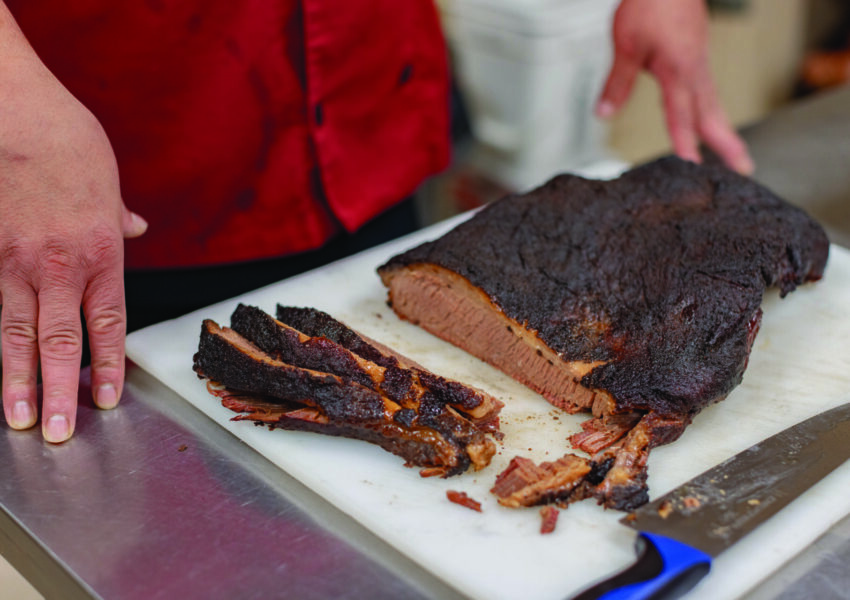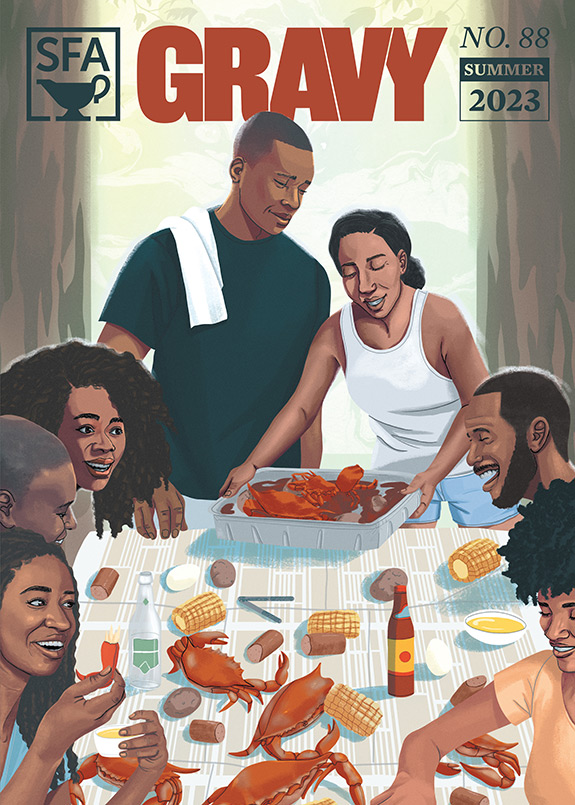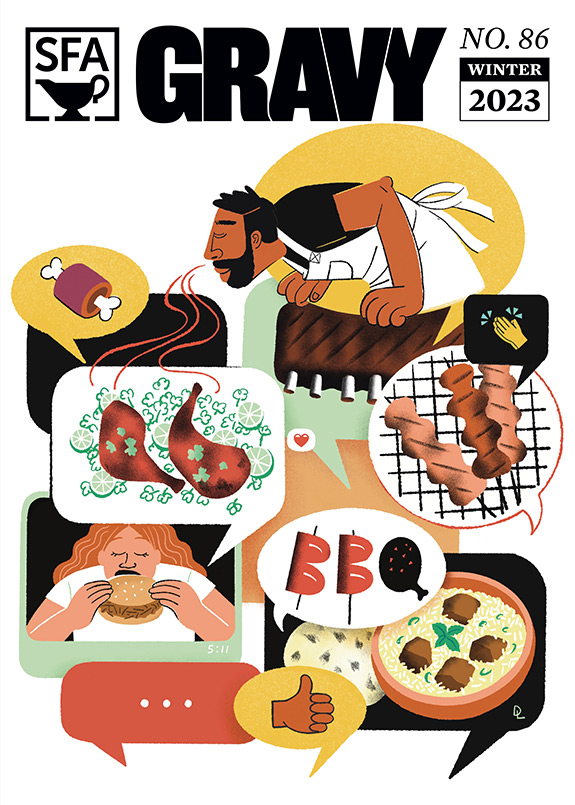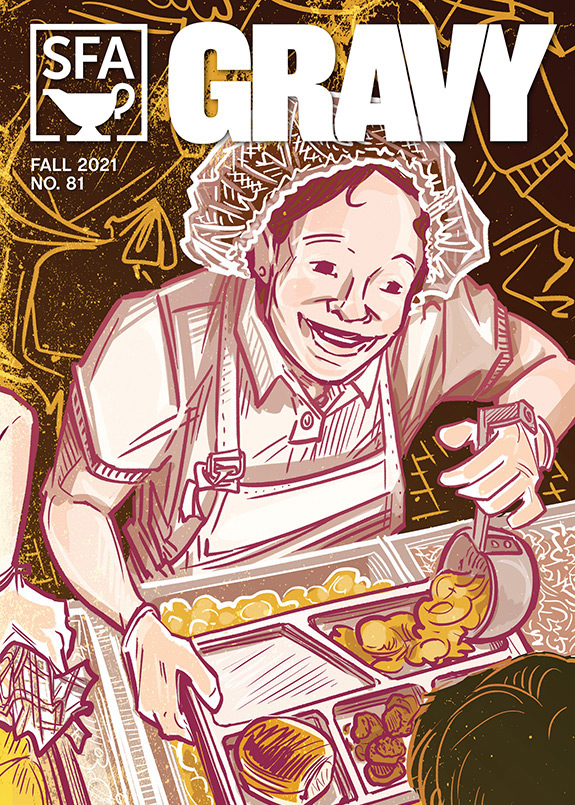This piece first appeared in Issue #52 of our Gravy quarterly.
Old Space, New Welcome Table
In Jackson, a young chef builds his first restaurant on history, family, and the taste of place
by Julian Rankin
IF ALL GOES AS PLANNED , Nick Wallace will open his first solo restaurant, Lunette, in 2015. The restaurant will occupy the lobby floor of the James Eastland Federal Building in downtown Jackson, Mississippi. La Poste, a modern bar also conceived by Wallace, will claim the adjacent space, backlit by a grid of old post-office boxes. The Eastland building, named for the late cotton plantation owner and U.S. senator from Mississippi, is being transformed into a multi-use development with apartments on the upper floors above Wallace’s dining ventures. Where justice and judgment were once served, Lunette and La Poste will offer house-made pork cracklings, onion-encrusted local lamb, and modern cocktails like the Bloom, a mix of vodka, cucumber, lime, homemade basil syrup, and cardamom bitters.
The young chef knows the building’s complicated past. In a fourth-floor courtroom, a New Deal–era mural titled “Pursuits of Life in Mississippi” depicts white men and women playing middle-class roles, while blacks pick cotton and play the banjo. “We had to wipe away, through the concept, all that authority that was present there,” says Wallace. “A lot of people in the past did not want to walk in that door. So I have to fix that. I have to clear the air of that authority, because I want everybody to feel at home.”
Wallace grew up on the outskirts of Edwards, Mississippi, west of Jackson. “I was the country boy,” he says. “Off in the woods, walking through the blueberry bushes, shoes off. I ate dirt as a kid. When I tell you I was living off the soil, I was living off the soil. Because I know what it tastes like.”
Back in Edwards, at the home of his uncle and aunt George and Learetha Donald, Wallace walks along the roadside looking for wild garlic. His uncle started with a single plant years back. “You go fishing and they say to put a little garlic on your bait to make the fish bite better,” Learetha Donald explains. “He had some left over and he put it out there and it went like wildfire.”
Here, Wallace’s paternal grandmother, Lennel Donald, raises chickens in a backyard coop. She and her sons seed their expansive gardens with beans, peas, okra, sweet potatoes, tomatoes, and squash. “Farm to table is the new trend,” Wallace says. “But that trend has always been in. It hasn’t always been talked about, but it’s always been the case. Mississippi has been farm to table forever.”
Wallace honed his chops in his mother’s kitchen. Toward the end of our day together, we head back, hungry, to the Jackson home of his mother, Susie Wallace, and grandmother Queen Morris. When we arrive, the stovetop is crowded with cornbread and chicken and fish and corn. “He was always in there with me,” Susie Wallace says. “I didn’t know the boy was paying attention. I just thought he was hungry. But he was watching.”
As Lunette edges closer to opening, all of Jackson will be watching. The menu will come, but the ethos is already clear. “When family would cook cornbread, they’d always cook more than they needed,” says Wallace. “You leave it out and the edges get dry. That’s when it ate better. Dip it into the juice of the greens. I’m thinking about a mimic of that. Have a vegetable stock that’s served on the table. You dip that cornbread in and it just comes back to life.”
Wallace imagines more than a restaurant. He thinks of Lunette as a place to break down barriers in downtown Jackson and forge shared mealtime experiences. He says it’s also an exercise in what a Mississippi restaurant can be. “People used to look at me and say, ‘Nick, a black guy, he grew up on a farm, he might have chased a pig or two around, he probably should be working at Collins Kitchen or Peaches.’”
Lunette won’t be a soul-food joint like Collins or Peaches. Instead, the grand Eastland building will prove a luxe setting for Wallace’s ventures. Enter the lobby and you will step into La Poste. Mailboxes once stuffed with light bills and bad news will accent a bar lit with bright promise. Above Lunette’s tables, giant skylights will pierce the vaulted ceilings. A rooftop above the dining room will double as an urban garden. Wallace likens the space to a cathedral, with “a big community table here, an open wine bar there, and this big kitchen in the back.”
Julian Rankin is the director of media and public relations at the Mississippi Museum of Art. He was the recipient of the 2013-2014 SFA fellowship at Rivendell Writers’ Colony.








